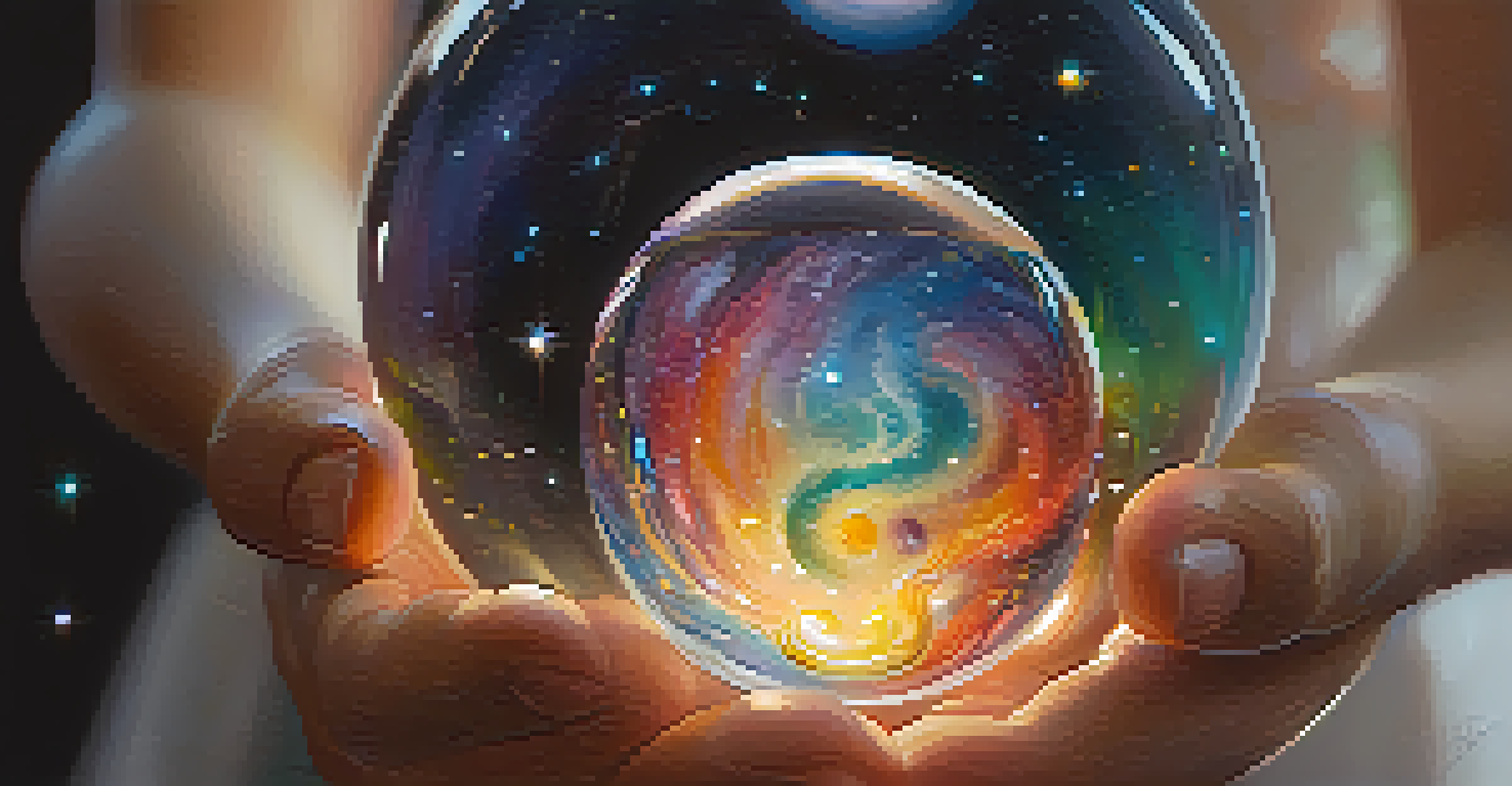Psychedelics and Consciousness: Expanding the Mind's Limits

Understanding Psychedelics: What Are They?
Psychedelics are substances that can alter perception, mood, and various cognitive processes. Common examples include substances like LSD, psilocybin (found in magic mushrooms), and DMT. They work primarily by interacting with serotonin receptors in the brain, leading to profound changes in consciousness.
Psychedelics can amplify our consciousness and provide profound insights into our emotional state and existence.
These substances have been used for centuries in various cultures, often in spiritual or healing contexts. While they were largely stigmatized in the 20th century, recent research has reignited interest in their potential benefits. Understanding their history is key to appreciating how they may expand the mind's limits.
Today, psychedelics are being studied for their therapeutic effects, particularly in treating conditions like depression and PTSD. This resurgence in interest highlights the need for a broader understanding of how psychedelics can enhance our consciousness and overall mental well-being.
The Science Behind Psychedelics and Consciousness
Research into psychedelics reveals that they can lead to altered states of consciousness, which some describe as transcendent experiences. These experiences can foster a sense of unity and connectedness, often leading to profound insights about oneself and the universe. The brain's default mode network (DMN) is significantly affected, promoting new neural pathways.

Decades of research indicate that psychedelics can temporarily disrupt the usual patterns of thinking, allowing for greater creativity and problem-solving. Imagine your brain as a well-trodden path in a forest; psychedelics can help you carve out new paths, leading to fresh perspectives. This is part of why many users report lasting changes in their attitudes and perceptions.
Psychedelics and Mental Health
Psychedelics are being studied for their therapeutic effects, particularly in treating conditions like depression and PTSD.
Moreover, studies suggest that psychedelics can enhance emotional processing, making individuals more open to their feelings. This emotional openness can lead to a deeper understanding of one's consciousness, potentially resulting in personal growth and healing.
Psychedelics in Therapy: Healing Through Experience
Psychedelics are increasingly being integrated into therapeutic settings, offering new hope for those struggling with mental health issues. Clinical trials have shown promising results, particularly with substances like psilocybin for depression and MDMA for PTSD. These therapies often involve guided sessions, allowing individuals to navigate their experiences safely.
The experience of psychedelics can lead to a deeper understanding of ourselves and the interconnectedness of all things.
During these sessions, patients may confront deeply-rooted emotions and traumas, leading to significant breakthroughs. The therapeutic setting creates a safe space for exploration, akin to having a trusted guide on a challenging hike. This guidance can be crucial in helping individuals process their experiences constructively.
As a result, many participants report a sense of relief and a newfound perspective on their lives. The potential for psychedelics in therapy underscores the need for a shift in how we view these substances—not just as recreational drugs but as powerful tools for healing and understanding consciousness.
Personal Experiences: The Journey Within
Many who have experimented with psychedelics share transformative experiences that deeply affect their understanding of consciousness. These journeys often involve vivid visual imagery, heightened emotions, and profound existential realizations. For some, these experiences bring clarity and a sense of purpose, reshaping their outlook on life.
Consider someone who, during a psychedelic experience, confronts feelings of fear or inadequacy. By navigating these emotions in a heightened state of awareness, they may emerge with a deeper understanding of themselves. This kind of introspection can be a powerful catalyst for personal growth.
Cultural Significance of Psychedelics
Psychedelics have a rich history in various cultures, often linked to spiritual practices and healing traditions.
While not everyone has the same experience, the potential for self-discovery is a common thread. Many describe feeling more connected to others and the world around them, suggesting that psychedelics can help dissolve the boundaries that often limit our consciousness.
Cultural Perspectives: Psychedelics Through History
Psychedelics have played a significant role in various cultures throughout history, often linked to spiritual and religious practices. Indigenous groups in the Amazon, for instance, have used ayahuasca for centuries as a means of connecting with the spiritual realm. These practices highlight the deep-rooted belief in the mind-expanding potential of psychedelics.
In the 1960s, psychedelics gained popularity in Western culture, often associated with countercultural movements seeking expanded consciousness. This era brought forth significant explorations of the mind, but it also led to backlash and stigmatization. Understanding this historical context helps clarify the modern conversation about psychedelics.
Today, there is a growing movement to reclaim these substances from their troubled past. Many advocate for a return to their original uses as tools for healing and enlightenment, illustrating the ongoing evolution of our understanding of consciousness.
The Risks and Responsibilities of Psychedelic Use
While the potential benefits of psychedelics are exciting, it's essential to acknowledge the risks involved. Not everyone reacts positively to these substances; some may experience anxiety, paranoia, or disturbing visions. Being aware of these risks is crucial for anyone considering this journey into altered states of consciousness.
Responsible use involves understanding one's mental health history and the setting in which the experience takes place. A supportive environment and a clear mindset can make a significant difference in the outcome. Think of it as preparing for a road trip; having a reliable vehicle and a good map can enhance the journey.
Risks of Psychedelic Use
While promising, psychedelics carry risks, making it essential to approach their use responsibly and in a supportive environment.
Moreover, ongoing research emphasizes the importance of guidance during psychedelic experiences. Whether through therapy or guided sessions, having a trusted individual can help navigate the complexities of the mind, ensuring a safer experience. This approach not only enhances personal growth but also respects the profound nature of these substances.
Future Directions: The Evolving Landscape of Psychedelics
The landscape of psychedelics is rapidly evolving, with increasing interest from researchers, therapists, and the public. As more studies are conducted, our understanding of how these substances affect consciousness continues to deepen. This research may lead to new therapeutic applications and a broader acceptance of psychedelics in society.
The recent wave of legalization and decriminalization in some regions reflects a shifting attitude toward these substances. As society becomes more open to exploring psychedelics' potential, we may witness a renaissance of consciousness exploration. Imagine a world where these tools are integrated into healing practices and spiritual growth.

Looking ahead, it's vital to continue discussions about safe practices and responsible use. By fostering a culture of respect and understanding, we can unlock the full potential of psychedelics in expanding our consciousness while minimizing risks. The future is bright for those willing to explore the mind’s limits.